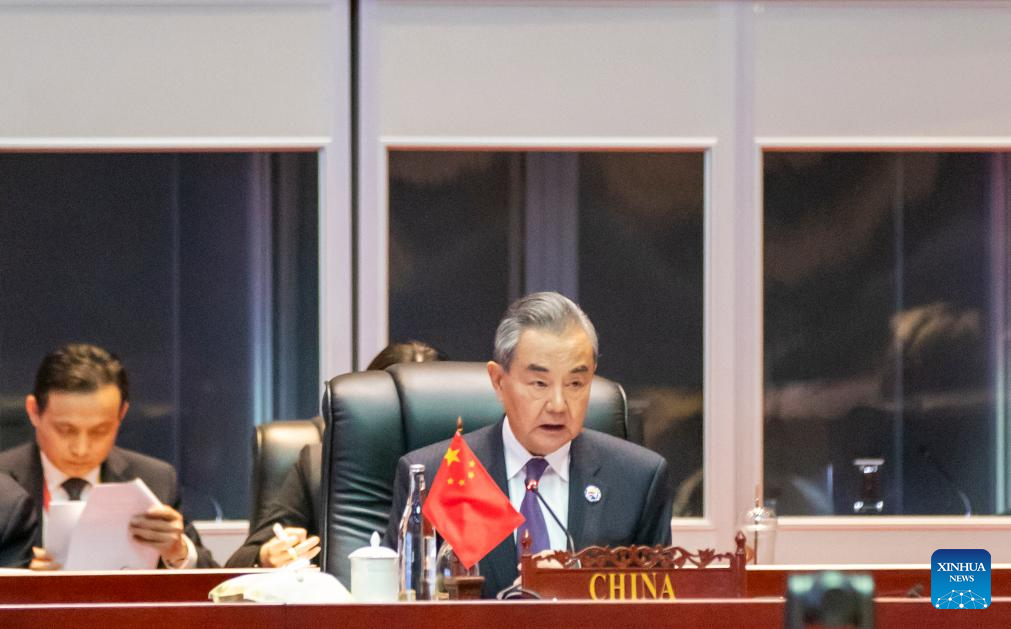
Foreign ministers of the Association of Southeast Asian Nations concluded their 57th ministerial meeting on Saturday, reaffirming the bloc’s commitment to implementing the ASEAN Community Vision 2025, strengthening ASEAN centrality and promoting regional peace, security and stability.
A joint communique was signed at the end of a series of meetings held in Vientiane, capital of this year’s rotating chair Laos. It lays the groundwork for the upcoming ASEAN Summit, scheduled to take place in Laos in October.
The foreign ministers pledged to resolve disputes peacefully in accordance with international law, including the 1982 United Nations Convention on the Law of the Sea, the communique said.
Lao Foreign Minister Saleumxay Kommasith underscored the importance of maintaining ASEAN unity amid global political upheavals at the meeting.
Additionally, the 31st ASEAN Regional Forum foreign ministers’ meeting called for enhanced cooperation on ferry safety, counterterrorism, combating transnational crime, and disaster reduction.
Indonesia’s Foreign Minister Retno Marsudi said on X of the need to strengthen the ASEAN Regional Forum for preventive diplomacy, by focusing on emerging challenges, reinforcing efforts to ensure maritime stability and ensuring that the forum remains an inclusive process.
The ministers reaffirmed the forum’s role as the “leading regional security forum” in the Asia-Pacific for fostering constructive dialogue and cooperation among its participants.
Mustafa Izzuddin, a senior international affairs analyst at Solaris Strategies Singapore, said the communique reaffirmed the importance of peace and security in the region.
He said it aligns with the “ASEAN ethos”, which adheres to international law and UN conventions, supports the diplomatic resolution of conflicts, advocates for the protection of civilians in the spirit of humanitarianism and focuses on sustaining global peace.
James Chin, a professor of Asian Studies at the University of Tasmania in Australia, said the communique revealed the group’s concern regarding the Myanmar crisis.
ASEAN foreign ministers reiterated their commitment to the Five-Point Consensus agreed by ASEAN leaders, which will serve as the “main reference” for addressing the Myanmar crisis.
“We recognized the strategic importance of our region for our peace, security, stability and prosperity, as well as for those of our external partners,” they said in the communique.
Efforts commended
They also commended Alounkeo Kittikhoun, the special envoy of the ASEAN Chair on Myanmar, “for his efforts since his appointment in early 2024 as we continue to promote progress in the implementation of the (Five-Point Consensus) in its entirety”.
“We appreciated his efforts to continue reaching out to parties concerned in a sustainable manner and are confident in his resolve to help the people of Myanmar to achieve an inclusive and durable peaceful resolution that is Myanmar-owned and — led for peace, security and stability in the region,” the communique said.
The ministers have likewise committed to upholding regionalism and multilateralism and stressed on the importance of adhering to key principles, shared values and norms enshrined in the UN Charter, the ASEAN Charter, the Declaration on Zone of Peace, Freedom and Neutrality, among others.
Singapore’s Foreign Minister Vivian Balakrishnan said the region needs to remain as “an oasis of peace, stability and security”, said a report published by The Straits Times.
The joint communique added, “We reiterated our commitment to intensifying our work toward a people-oriented, people-centered, and rules-based ASEAN, and continued to encourage the meaningful participation of the people, societies and other stakeholders in the ASEAN Community building process.”
ASEAN also urged for the peaceful resolution of tensions in the South China Sea, condemned attacks against civilians and public infrastructure in Gaza, and called for the immediate cessation of hostilities in both Gaza and Ukraine.


